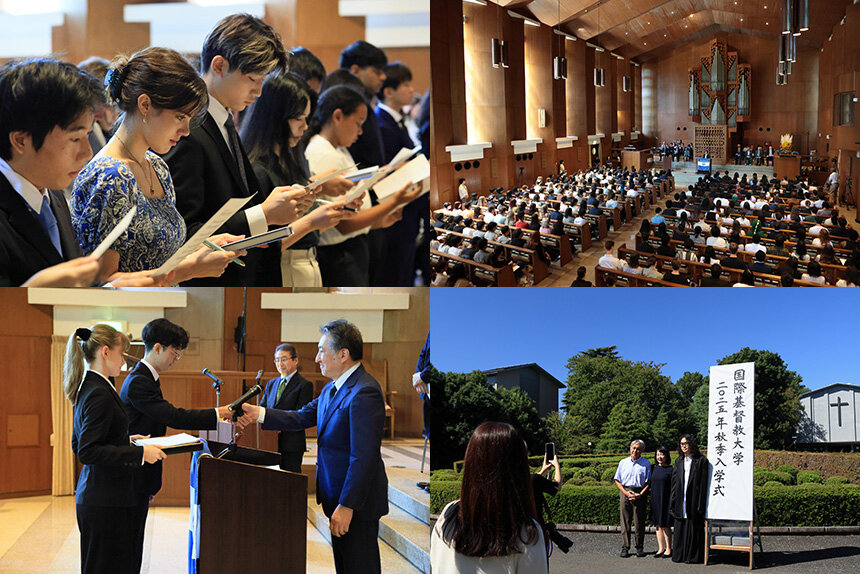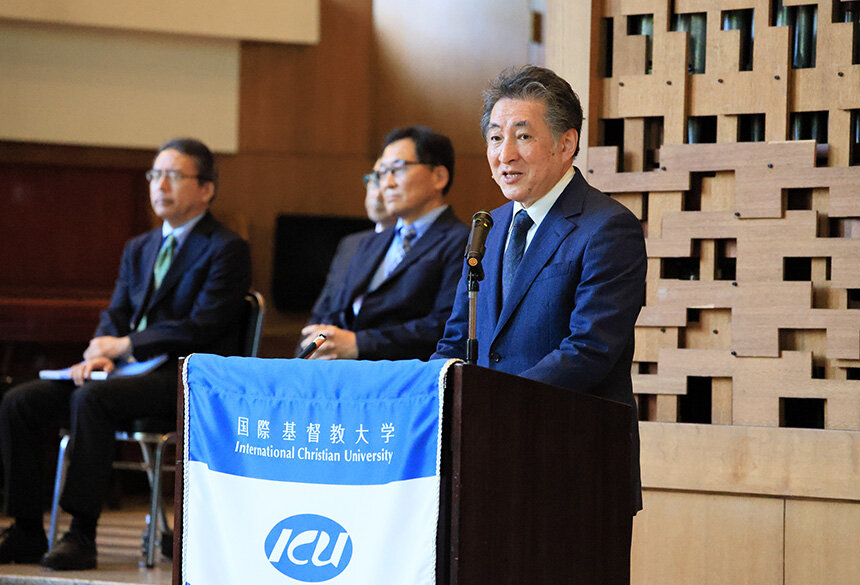NEWS
2025年秋季入学式を挙行
公開日:2025年9月2日

9月2日(火)、大学礼拝堂において秋季入学式を挙行し、海外の高校や国内のインターナショナルスクールを卒業した学生をはじめ、交換留学協定校からの留学生など、学部・大学院合わせて332名の学生が本学に入学しました。
入学式は、参加者一同での讃美歌歌唱、オルバーグ, ジェレマイア L.宗務部長代行の祈祷で始まりました。続いて、エスキルセン,スティーブン エドワード宗務委員が「ルカによる福音書 第10章 38-42 節」を朗読しました。
その後、献学以来の伝統に則り、学部・大学院の新入生一人一人の名前が読み上げられ、岩切正一郎学長より新入生へ、激励の式辞が述べられました。そして、新入生代表が世界人権宣言の原則に立ち本学での学生生活を送ることを誓う「学生宣誓」を読み上げ、学生全員が「学生宣誓」に署名を行いました。
また、学生宣誓への深い理解とともに大学生活をスタートさせてほしいという願いから、ICU生が英語翻訳を手掛けた『ビジュアル版世界人権宣言』が新入生全員へ配布されました。
式は英語で行なわれ、岩切学長の式辞も英語で読まれました。学長式辞の英文に続く日本語はその翻訳です。
岩切正一郎学長 式辞(全文)

A warm welcome to all of you who are entering our College of Liberal Arts and our MA and PhD programs. At the same time, I extend my warmest regards to all your family members and friends who are joining us online.
In Japan, the disaster caused by the second World War made people deeply recognize the value of peace. After the end of the War, Japan was under Allied occupation, and regained its sovereignty in 1952. It was at this time that our university took its first steps as an education and research institution, purchasing the land for its campus with donations from citizens of North America and Japan, under the motto "University of Tomorrow".
The first students entered ICU in 1953.
Since its founding, ICU's mission has been to nurture students to become international citizens, or in today's terms, global citizens, and peacebuilders. And from the outset, ICU has valued individuality, freedom, democracy, equity, dialogue, internationalism, diversity and critical thinking. Underpinning these values were a mindset and code of behavior in the service of God and humanity. These were not just ideals, but also concrete content to be put into practice in life.
One of the important roles of university education is to actualize these ideals, to anchor them in one's own culture through daily life on campus, and to share them with others.
As the most appropriate educational system for this purpose, ICU has practiced a liberal arts education since its inception, currently under the name of Arts and Sciences. It is a flexibly structured education and research system that provides abundant intellectual nourishment.
You will now be studying in a department or graduate school program of Arts and Sciences. I have repeatedly pointed out what Arts and Sciences mean in the liberal education of ICU: Science here has the original meaning of the Latin word, scio (scientia)- knowledge, knowing; Art is also used in its original sense of "skill". In other words, learning in the liberal arts is a combination of the act of discovering the unknown and bringing it into the realm of knowledge, and the skill of transforming something new and unformed into a form that can be shared with others.
It may sound tautological, but the liberal arts liberate you.
In his recent book, Joseph Stiglitz, a Nobel prize winning economist, says that 'a liberal education is freeing', and he explains how it works as follows: 'it enables people to see matters more broadly, beyond the viewpoint they may have been given by their parents or their community. It enhances individual agency and autonomy.' (Stiglitz, Road to Freedom, 2024)
Through your learning at ICU you can broaden your viewpoint and will have a deeper understanding of the world, nature, society and humanity.
In fact, as the basis of learning at ICU there is passion and enjoyment to discover something new and to share it with others. I hope that, by pursuing your studies, you will become someone who brings innovation to society and, at the same time, I hope you will be innovative for yourselves.
*
When I was a graduate student, I came to know an ancient Greek proverb: kalepa ta kala, which means 'fine things are difficult'. Socrates, for example, refers to it in Plato's Republic when he tries to persuade his interlocutors of the necessity of the true type of usage of philosophy required for a State to attain perfection.
In my case, it was in a book of French Renaissance poetry that I learned the proverb. This proverb can be adopted by each one of us for our own intellectual interest, and each domain of interest has its own 'fine things'.
In your college life, you will certainly pursue 'fine things' as you determine your academic and ontological objectives. Your 'fine things' represent a kind of solution you will discover to questions you will set yourself. In our current social, international and natural situations, many problems, such as climate change, war, inequality, disinformation, etc. confront us. The act of finding solutions will not be easy and, once found, theoretical solutions will be hard to implement in society. So yes, 'fine things are difficult', but I hope you will like this difficulty as a means of creating a good society in order to live in harmony with others and with nature. Your learning at ICU which starts today is the basis of this creation you will pursue through your life.
Education shapes the way we see the world and, at the same time, through critical thinking, it makes us conscious of the difference and diversity in our respective thoughts about the world, and the visions we have of it. ICU academic and office staff seek to contribute to your shaping of yourselves, of your own systems of thought and visions, and of your moral development in which honesty and trustworthiness are valued as indispensable for good communication.
Please enjoy the Liberal Arts at ICU, make good friends, and have rich experiences !
Welcome to ICU !
教養学部ならびに大学院博士前期課程・後期課程新入生の皆さま、ご入学おめでとうございます。また、ご家族、ご親戚、ご友人の皆様にも、心よりお祝い申し上げます。
第二次世界大戦によって引き起こされた悲惨は、日本において、人々に平和の価値を深く認識させることとなりました。戦後、日本は連合国軍の統治下におかれ、主権を回復したのは1952年です。私たちの大学が教育・研究機関としての一歩を踏み出したのはちょうどこの時期にあたります。北米および日本市民の寄付によってキャンパスの土地を購入し、「明日の大学」という理想を掲げました。
第一期生は1953年に入学しました。
その創設時から、ICUのミッションは、学生を国際的市民、今の言葉で言えばグローバル・シティズンへ、そして平和を構築する人へ育てることであり続けています。その理念のもとに、ICUは個としての人格、自由、民主主義、公正、対話、国際主義、多様性、そして批判的思考を大切にしてきました。それを支えていたのは、神と人とに奉仕する心構えと行動規範でした。これらは単なる観念ではなく、人生・生活において実践されるべき具体的な内実でもありました。
大学教育の大切な役目のひとつは、これらの理念を現実化すること、それらをキャンパスの日常生活を通じて自分自身の文化のなかへ根付かせ、それを他者と共有することにあります。
この目的に最もかなう教育システムとして、ICUは創立時から教養教育(リベラルアーツ教育)を実践してきました。現在では「アーツ・サイエンス」(Arts and Sciences)の名の下にそれを行なっています。それは教育・研究の柔軟な構造で、豊かな知的涵養をもたらすことができます。
みなさんは、これから、学部や大学院でこの「アーツ・サイエンス」の学びを始めることになります。ICUの教養教育(liberal education)において、この「アート」と「サイエンス」がどのような意味を持つのか、私はこれまでも繰り返しお話してきました。ここで言う「サイエンス」は、語源であるラテン語のscio(私は知っている、という動詞。名詞ではscientia)につながる「知識、知ること」という意味を持っています。「アート」も元々の「技術」という意味を持っています。言葉を換えて言えば、リベラルアーツにおける学びとは、未知のものを発見しそれを知の領域へ運び込む行為と、未だ形になっていない新しいものや事柄を他者と共有できる形へ変形する技術の融合です。
同語反復的に聞こえるかもしれませんが、リベラルアーツはみなさんをリベレート(解放)します。
ノーベル経済学賞を受賞したスティグリッツは、最近の著書のなかで、「教養教育は自由をもたらす」(a liberal education is freeing)と言っています。そしてそれをこう説明しています。「教養教育は自由をもたらす。〔教養教育によって人は〕親や地域社会から与えられた視野を超えた、もっと幅広い視野を手に入れ、主体性(individual agency)や自主性(autonomy)を育むことができる」。(Joseph Stiglitz, Road to Freedom, 2024。邦訳は『資本主義と自由』(山田美明訳))
ICUでの学びを通じて、みなさんは自分の視野を広げることができます。そして自然、社会、人間でできている世界をより深く理解するようになります。
じっさい、ICUでの学びの根底には、新しいこと・ものを発見しそれを他者と共有する情熱と喜びがあります。ぜひみなさんも、勉強や研究を通じて、社会へイノベーションをもたらす人に、そして同時に、自分自身にたいしてもイノベーティブである人に、なっていただければと思います。
*
私が大学院生の頃、古代ギリシャのことわざに出会いました。「kalepa ta kala」ということわざで、「美しいものは難しい」という意味です。ソクラテスもプラトンの『国家』のなかで、対話者に向かって、国家が完全になるために求められる哲学の利用の必要性について説得しようとするときに、そのことわざに言及しています。
私の場合は、フランス・ルネサンスの詩の本のなかでこのことわざを知りました。そのように、このことわざは、私たち一人ひとりが、自分の知的興味に従って使うことができます。それぞれの興味の領域に「美しいもの」があります。
みなさんは、これからの大学生活のなかで、自分の学問的あるいは存在論的目的を決定するときにこの「美しいもの」をおそらく追求するでしょう。自分の「美しいもの」は、自分自身にたいして設定する問題解決のために発見する、その解決のあり方を表しています。私たちの現在の社会的、国際的、自然的状況では、気候変動、戦争、不公正、偽情報、等々の多くの問題が立ちはだかっています。解決策の発見は容易ではありません。そして、たとえ発見されたとしても、理論的解決法を具体的に社会実装するのも容易ではありません。そう、「美しいものは難しい」のです。けれども、みなさんは、他者と、そして自然と、調和して生きるための良い社会を創造する道として、この困難を好むものと私は期待しています。今日から始まるみなさんのICUでの学びは、みなさんが一生を通じて追求することになるこの創造の基礎になります。
教育は私たちが世界を見る、その見方を形作ります。同時に、教育は、批判的思考を通じて、私たちに、私たちそれぞれの世界についての思考と、世界について持つヴィジョン(視像)における、違いと多様性を意識させてくれます。ICUの教育スタッフ、事務スタッフは、みなさんが自分自身を形作り、自分自身の思考とヴィジョンのシステムを形作ることに、そしてみなさんの倫理的な発展に、寄与したいと思っています。その倫理的な発展においては、誠実であること、信頼される人であることが、良いコミュニケーションのための価値として大切にされています。
どうぞICUのリベラルアーツを楽しみ、良い友人をつくり、豊かな経験を得てください。
ICUへようこそ!